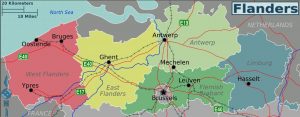Ireland’s Gateway to and from the continent post-Brexit – Flanders
The Brexit rollercoaster continues. Theresa May has been succeeded by Boris Johnson in the UK premiership.
At the time of writing it appears that we are entering a new period of extreme political brinkmanship with three months to go to the October 31st deadline. What the outcome will be is anyone’s guess in this moment of volatility and uncertainty. However, one thing that we can be sure about in Ireland, whatever the outcome of the Brexit process, is that stability and certainty on the future trading relationship with the United Kingdom is very far off. Consequently, we must accelerate our plans and actions as business people to mitigate the worst effects of Brexit and to ensure that our businesses can survive and thrive into the future.
The difficulty that many businesses face, particularly SMEs, is that the high degree of uncertainty renders it very difficult to implement mitigation and contingency plans that may require substantive investments of time and money. More so when there is a probability that these investments might count for naught if things turn out differently. In my view however, this does not justify adopting a wait-and-see strategy, which worryingly, seems to be the default strategy of some Irish SMEs. Rather, what I see the most proactive and ambitious Irish companies doing is take a longer view, well beyond the Brexit deadline, to see what initiatives they can implement now that will stand them in good stead in three to five-year’s time regardless of the outcome of the Brexit process.
In that context. one European region that is going to be key to Ireland’s ability to overcome the challenges presented by Brexit is the region of Flanders in northern Belgium. Flanders is a small but densely populated region of about 6.6 million people with a highly developed and diversified economy located between Brussels and the Dutch border in northern Belgium. Flanders is in one of the most geographically strategic locations in Europe with easy access to sea, road, rail and air networks that provide access to the major markets of the European Union as well as to the wider world through its deep-sea ports at Zeebrugge and Antwerp. In addition to its highly diversified and sophisticated economy, Flanders possesses a well-educated multilingual workforce and is regarded as the logistics hub of Europe par excellence. Flanders is the region in which some of the most well-known Belgian cities such as Antwerp, Ghent and Bruges are located.
Not only does Flanders constitute a substantial market for Irish companies to diversify both their imports and exports, but it is also a prime location for Irish investors looking to locate production and distribution facilities on the continent to access the rest of the EU. It also provides ready access to the post-Brexit UK markets with its ro-ro ferry links from the port of Ostend directly into southeast England and the major population centres of the United Kingdom. Already, the largest ro-ro freight ferry in the world has entered service on the Dublin to Zeebrugge route with capacity for 8,000 lane metres of road freight vehicles. Additionally, Zeebrugge is set to become the North Europe Hub of the giant Chinese Cosco Shipping Lines. As well as Zeebrugge and Ostend, Flanders is also home to the globally connected port of Antwerp, providing deep-sea maritime links all over the world covering all major traffic flows and some 224 million tonnes of maritime goods turnover.
The regional government in Flanders, through the Belgian embassy in Dublin, is actively seeking to encourage Irish businesses to look to Flanders are a preferred location for trade and investment. Indeed, there are already over 800 European Distribution Centres (EDCs) located in the Flanders region which is the highest density of EDCs in Europe. Likewise, many of the multinationals that Irish SMEs have successfully supplied and supported in Ireland are also located in Flanders including such familiar names as Pfizer and Proctor & Gamble among others.
For Irish companies looking to implement long-term, Brexit-proof, operating strategies for their businesses, whether for the import of products and materials, the export of their own production or investment in production and distribution facilities to better access European and global markets, Flanders is likely to figure highly on the list for the most ambitious of our companies who are determined to thrive in the future come what may.
References
- Flanders Investment and Trade – investinflanders.com
- Antwerp Port Authority – portofantwerp.com
- Port of Zeebrugge – portofzeebrugge.be
- North Sea Port – northseaport.com
- Port of Oostende – portofoostende.be
- Belgian Embassy in Ireland – https://diplomatie.belgium.be/en/ireland
- Read more on the subject, Britain can never leave Europe Click Here

Patrick Daly contact Pdaly@albalogistics.com
Patrick Daly Online Training Course Click Here
Patrick Daly Book: International Supply Chain Relationships Order Here

